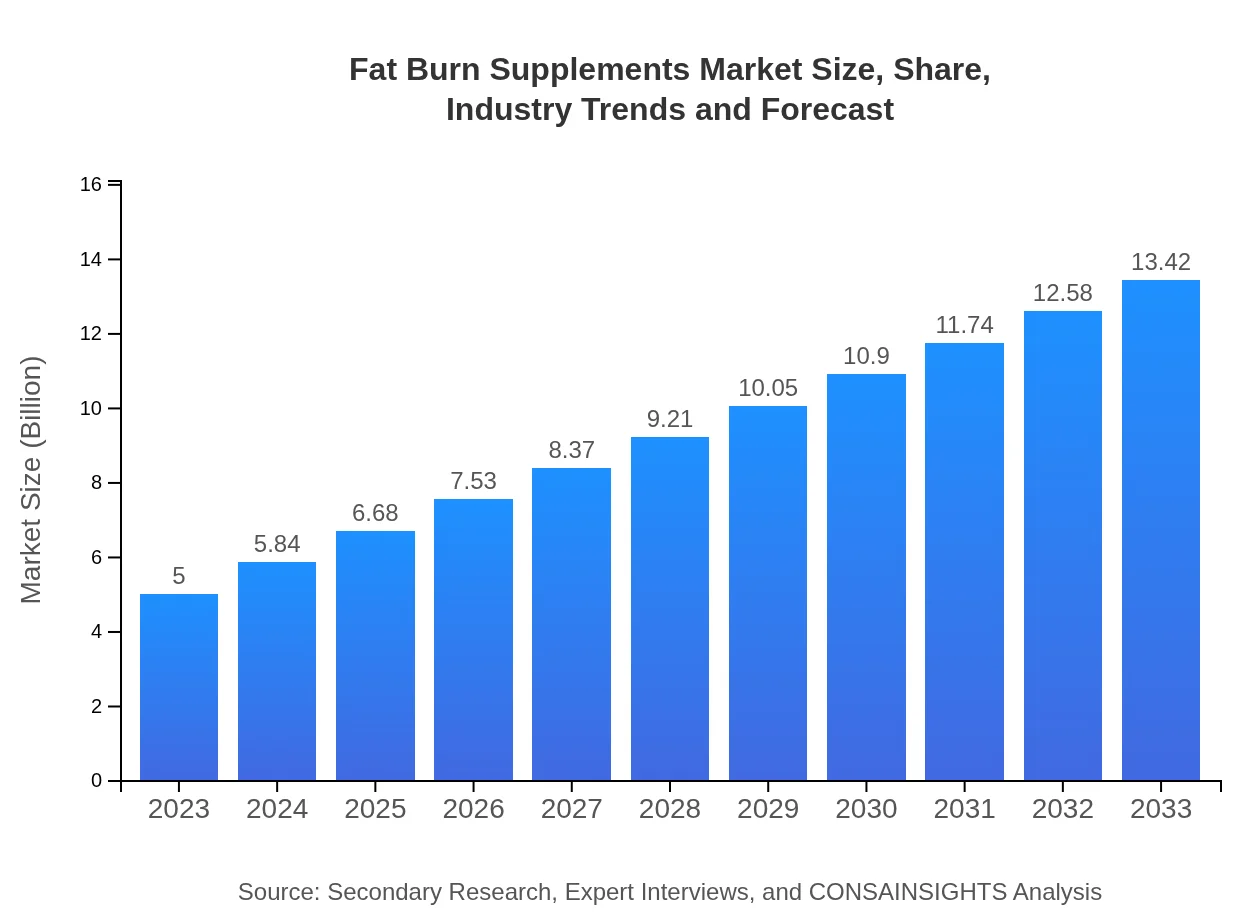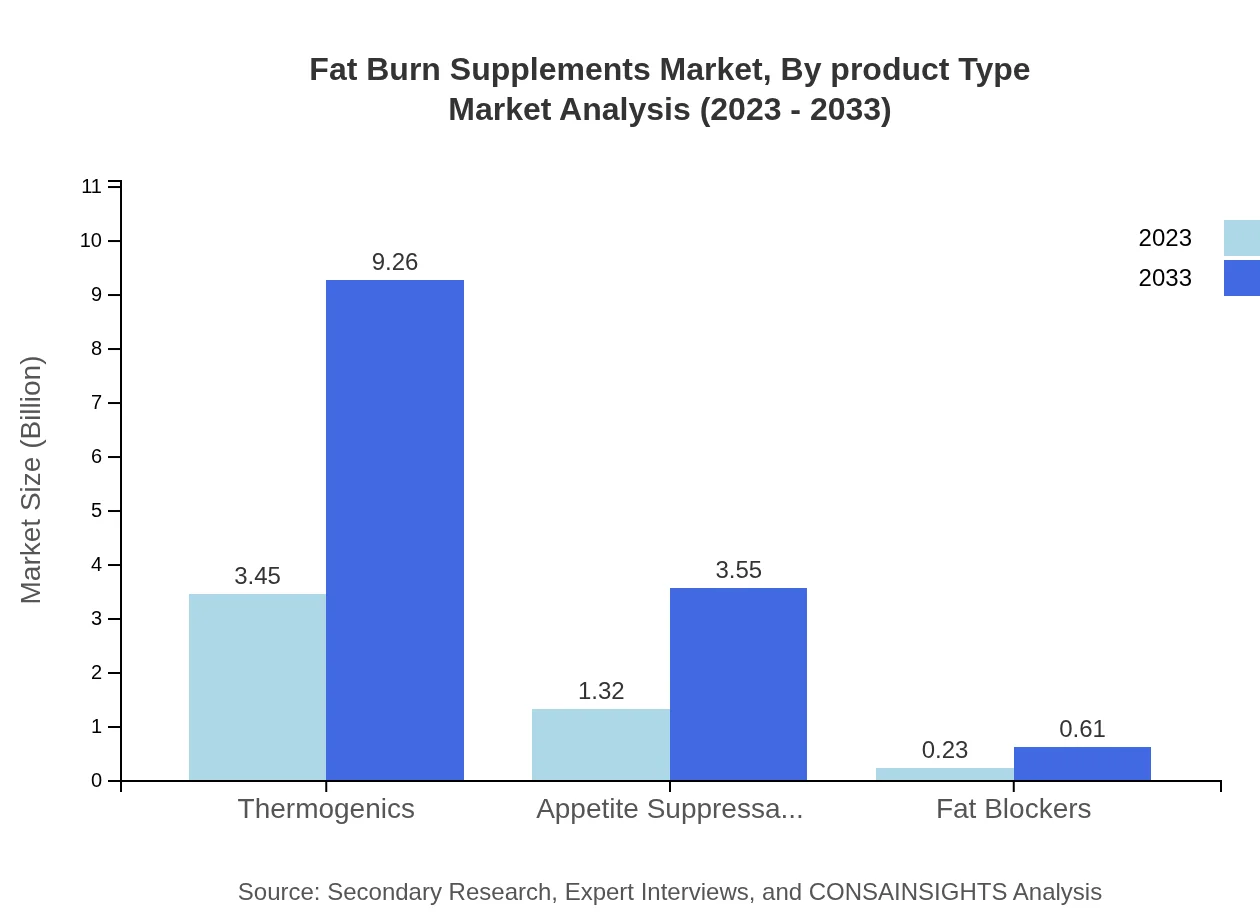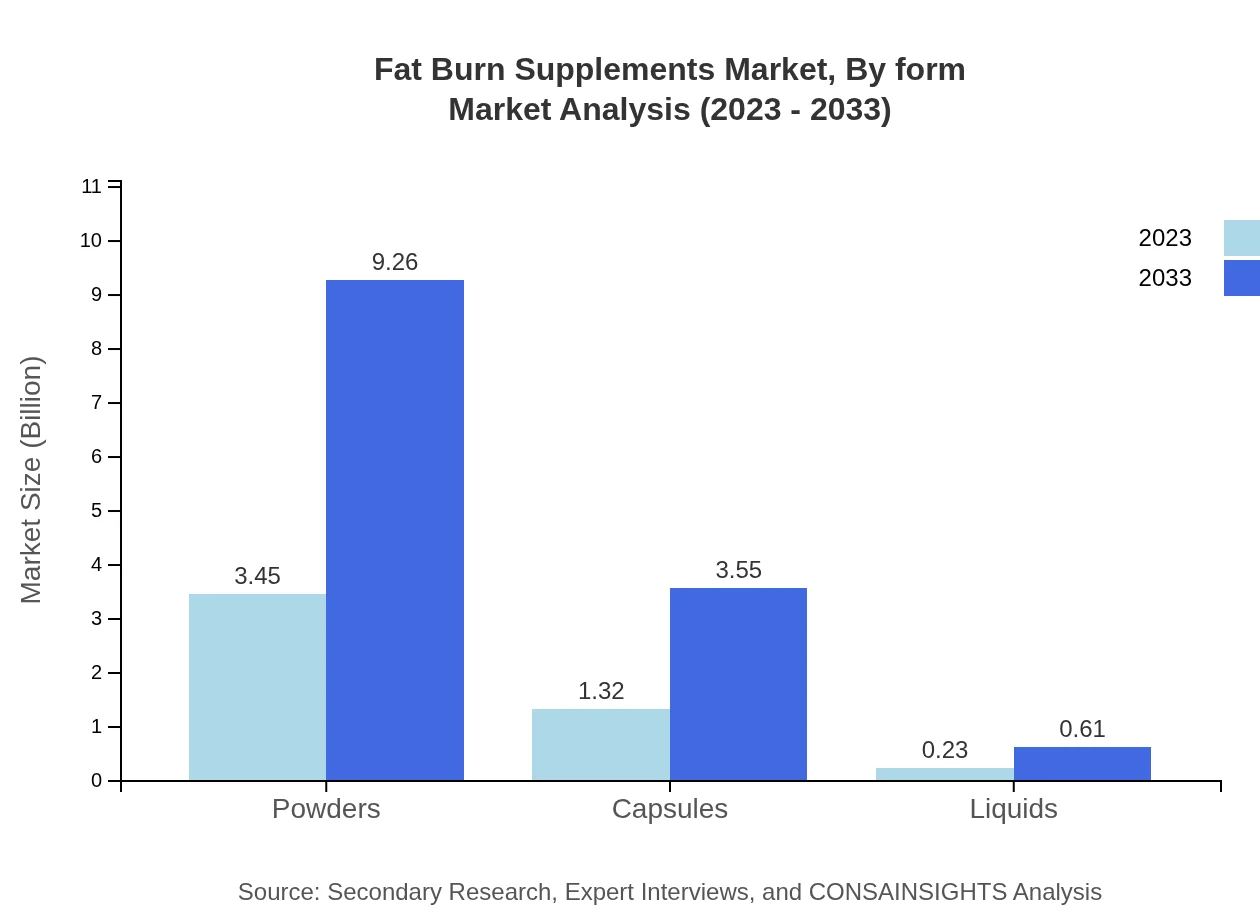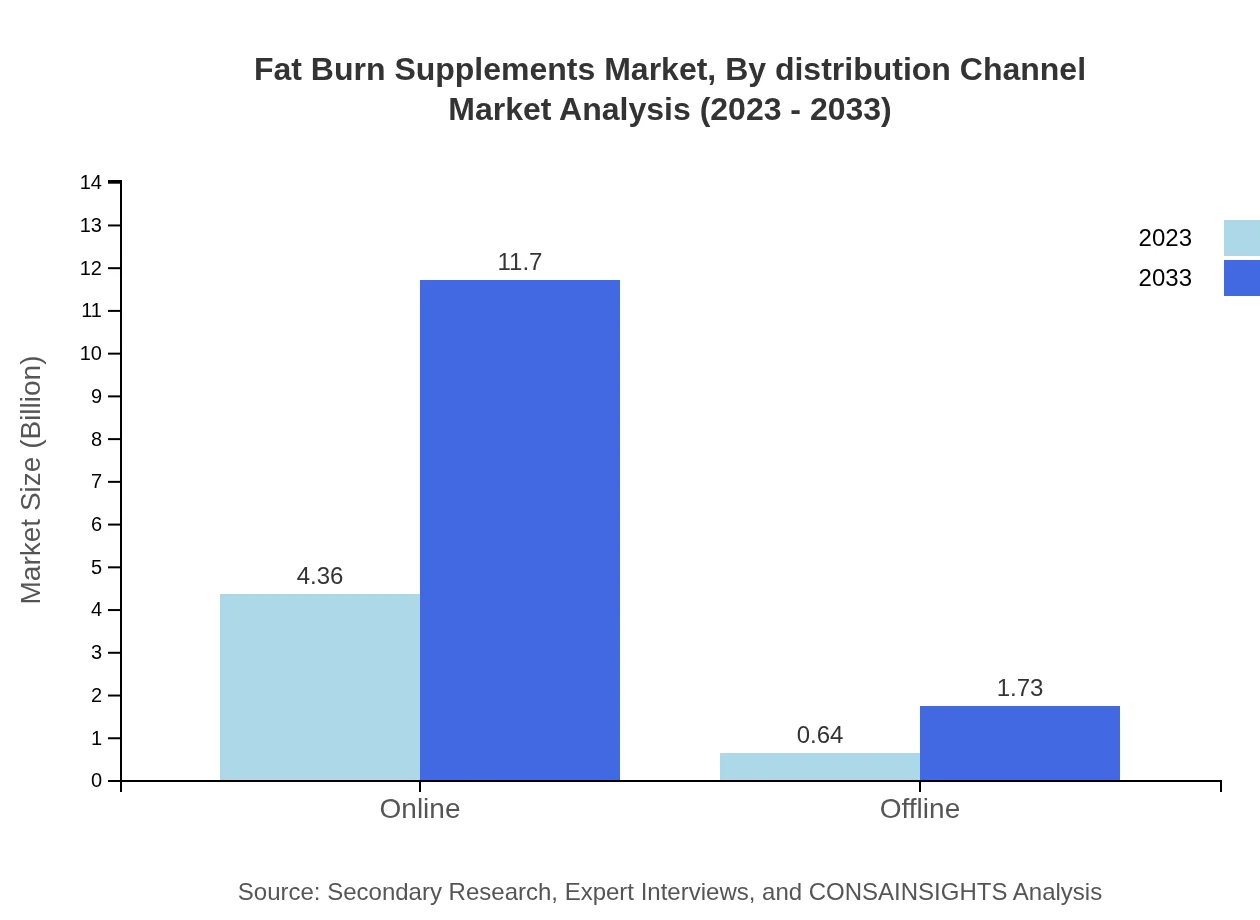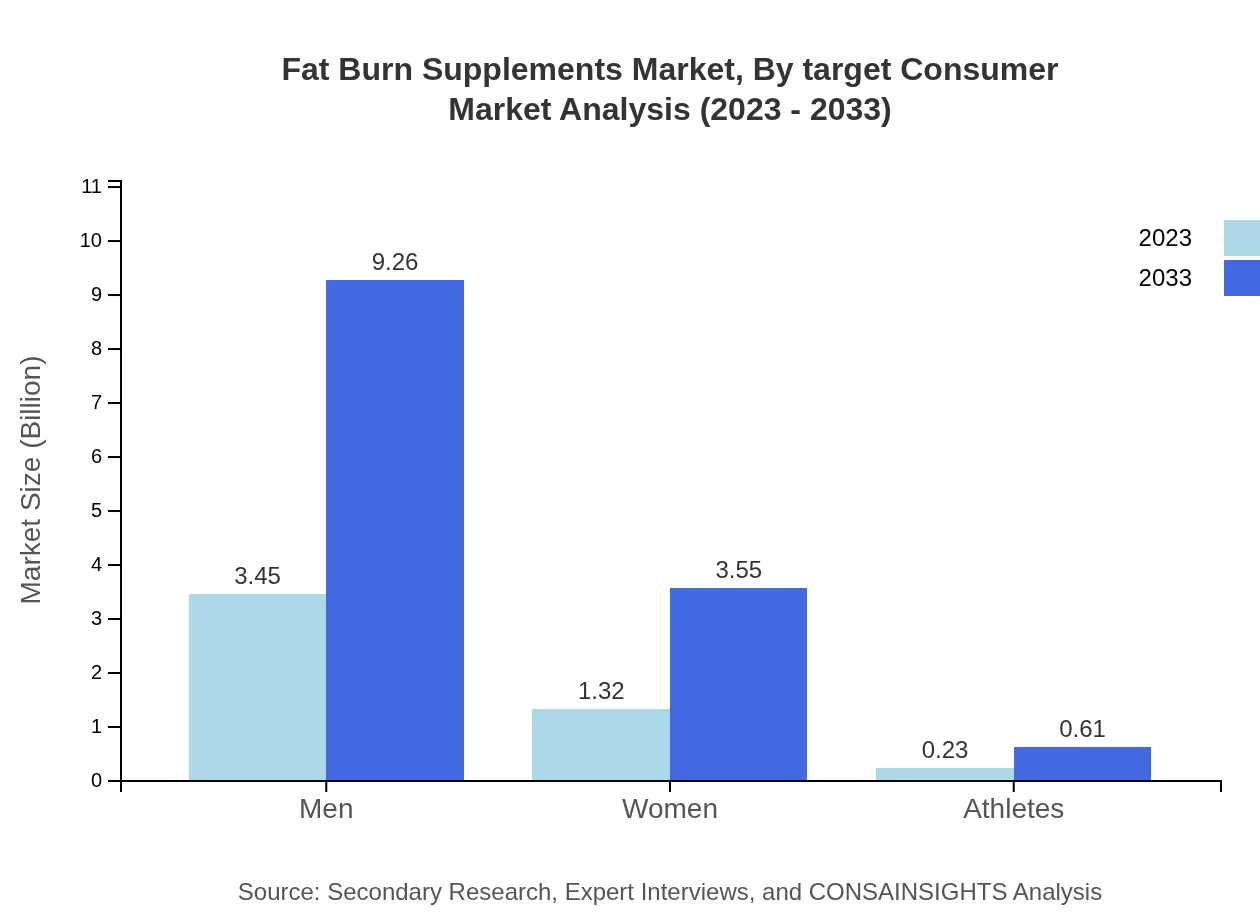Fat Burn Supplements Market Report
Published Date: 31 January 2026 | Report Code: fat-burn-supplements
Fat Burn Supplements Market Size, Share, Industry Trends and Forecast to 2033
This market report on Fat Burn Supplements provides a comprehensive analysis of the current landscape, trends, and forecasts for the period 2023 to 2033, offering insights into market size, growth potential, and segment performances across various regions globally.
| Metric | Value |
|---|---|
| Study Period | 2023 - 2033 |
| 2023 Market Size | $5.00 Billion |
| CAGR (2023-2033) | 10% |
| 2033 Market Size | $13.42 Billion |
| Top Companies | Nestlé Health Science, Herbalife Nutrition Ltd., JSK Nutritionals, GNC Holdings, Optimum Nutrition |
| Last Modified Date | 31 January 2026 |
Fat Burn Supplements Market Overview
Customize Fat Burn Supplements Market Report market research report
- ✔ Get in-depth analysis of Fat Burn Supplements market size, growth, and forecasts.
- ✔ Understand Fat Burn Supplements's regional dynamics and industry-specific trends.
- ✔ Identify potential applications, end-user demand, and growth segments in Fat Burn Supplements
What is the Market Size & CAGR of Fat Burn Supplements market in 2023?
Fat Burn Supplements Industry Analysis
Fat Burn Supplements Market Segmentation and Scope
Tell us your focus area and get a customized research report.
Fat Burn Supplements Market Analysis Report by Region
Europe Fat Burn Supplements Market Report:
Europe’s fat burn supplements market is also growing, with projections to expand from $1.61 billion in 2023 to $4.32 billion by 2033. The rise in fitness centers and health clubs, along with an increasing number of consumers seeking weight management solutions, is driving growth in this region.Asia Pacific Fat Burn Supplements Market Report:
The Asia-Pacific market for fat burn supplements is expected to grow from $0.90 billion in 2023 to $2.41 billion in 2033, reflecting a growing health consciousness among consumers in countries like China and India. Increasing fitness trends and a rise in disposable incomes are further driving market growth in this region.North America Fat Burn Supplements Market Report:
North America stands as a dominant region in the fat burn supplements market with anticipated growth from $1.84 billion in 2023 to $4.94 billion in 2033. The U.S. constitutes the largest market share, bolstered by a significant consumer base and a robust health and wellness trend.South America Fat Burn Supplements Market Report:
In South America, the fat burn supplements market is projected to exhibit a decline from -$0.04 billion in 2023 to -$0.11 billion in 2033 due to economic challenges and fluctuating currency values, impacting consumer spending on non-essential products such as dietary supplements.Middle East & Africa Fat Burn Supplements Market Report:
The Middle East and Africa market is expected to grow from $0.70 billion in 2023 to $1.87 billion in 2033, driven by growing awareness regarding obesity and the need for weight management solutions as lifestyle diseases become prevalent.Tell us your focus area and get a customized research report.
Fat Burn Supplements Market Analysis By Product Type
Thermogenics dominate the fat burn supplements market, expected to grow from $3.45 billion in 2023 to $9.26 billion in 2033, taking a significant market share. Appetite suppressants follow, growing from $1.32 billion to $3.55 billion. Fat blockers, while smaller, show potential as well, increasing from $0.23 billion to $0.61 billion during the same period.
Fat Burn Supplements Market Analysis By Form
Powdered forms are the most popular, projected to grow from $3.45 billion in 2023 to $9.26 billion by 2033, making up over 68% of the market share. Capsules will follow, expanding from $1.32 billion to $3.55 billion, while liquid forms will increase from $0.23 billion to $0.61 billion, growing steadily but remaining the least preferred format.
Fat Burn Supplements Market Analysis By Distribution Channel
Online sales channels dominate with a notable market size of $4.36 billion in 2023, expected to rise to $11.70 billion by 2033, capturing about 87% of market share. Offline retail, although smaller, is also growing steadily, increasing from $0.64 billion to $1.73 billion.
Fat Burn Supplements Market Analysis By Target Consumer
The market targeting men is substantial, expected to grow from $3.45 billion to $9.26 billion by 2033, making up 68% of the share. Women also significantly contribute with a growth from $1.32 billion to $3.55 billion. Athletes represent a niche segment predicted to move from $0.23 billion to $0.61 billion.
Fat Burn Supplements Market Trends and Future Forecast
Tell us your focus area and get a customized research report.
Global Market Leaders and Top Companies in Fat Burn Supplements Industry
Nestlé Health Science:
A leading health and nutrition company that combines food sciences with medical expertise, creating effective and reliable dietary supplements that support metabolic health.Herbalife Nutrition Ltd.:
Global leader in nutrition and weight management products, bringing science-based products to the market leveraging extensive research and innovative formulations.JSK Nutritionals:
Known for developing cutting-edge nutritional products, JSK Nutritionals focuses on formulation quality and scientific research, emphasizing effective fat-burning properties.GNC Holdings:
Specializes in health and wellness products, GNC has a wide portfolio of fat burn supplements that cater to diverse consumer segments, enhancing fitness and weight loss.Optimum Nutrition:
Known for its high-quality protein supplements, Optimum Nutrition provides a range of fat burning products designed for athletes and health enthusiasts, facilitating effective weight management.We're grateful to work with incredible clients.









FAQs
What is the market size of fat Burn Supplements?
The fat-burn supplements market is valued at approximately $5 billion in 2023, with a projected CAGR of 10%, indicating significant growth potential by 2033.
What are the key market players or companies in this fat Burn Supplements industry?
Key players in the fat-burn supplements market include Herbalean, MuscleTech, and BSN among others, known for their innovative products and extensive distribution networks.
What are the primary factors driving the growth in the fat Burn supplements industry?
Growth in the fat-burn supplements industry is driven by increasing health awareness, rising fitness trends, and consumer demand for weight management solutions, alongside advancements in the formulation of effective products.
Which region is the fastest Growing in the fat Burn supplements market?
The Asia-Pacific region is the fastest-growing market for fat-burn supplements, projected to expand from $0.90 billion in 2023 to $2.41 billion by 2033, driven by a growing consumer base interested in fitness.
Does ConsaInsights provide customized market report data for the fat Burn Supplements industry?
Yes, Consainsights offers customized market report data tailored to specific client needs in the fat-burn supplements industry, ensuring relevant insights and actionable data.
What deliverables can I expect from this fat Burn Supplements market research project?
Deliverables from the fat-burn supplements market research project typically include detailed market analysis, trend reports, competitive landscapes, and forecasting data segmented by demographics and product types.
What are the market trends of fat Burn supplements?
Current market trends in fat-burn supplements highlight a shift towards natural ingredients, increased usage among athletes, and a surge in online purchasing, which accounted for 87.13% market share in 2023.

